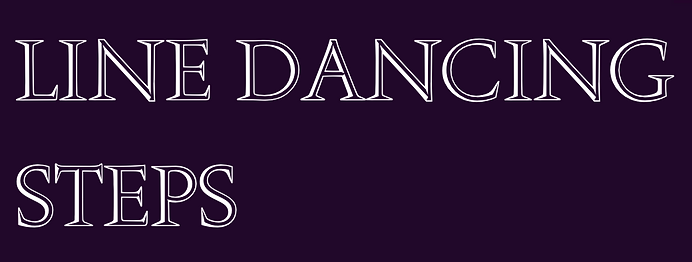
BALL CHANGE
A quick rock step using the ball of the foot using an “&” count.
BRUSH
The free leg moves forward or backward letting the ball of the foot make contact with the floor. There is not a weight change!
COASTER STEP
R Coaster Step eg: Step R Foot Back, Step L Together, Step R Foot Forward. 1&2 count. Cand Be Done R Or L Foot Lead, Forwards Or Backwards
DRAW or DRAG
Draw is to slide the free foot toward the weighted foot in any direction keeping the toe down to the floor (feet do not have to come together). Drag is to slide the free foot toward the weighted foot with the toe up - heel in contact with the floor (this will limit directional movement).
GRAPEVINE
A side step, cross behind, step side - usually finished off with either a touch, stomp, kick, or hitch as you bring your feet together.
JAZZ BOX
Cross, Back, Side, Cross/Touch/StepEg: Right Jazz – Cross R Over L, Step L Back, Step R To R Side, Step L Together
KICK - BALL - CHANGE
This is a “Ball Change” that is preceded by a loose, low kick usually forward. Counted as 1&2 or 3&4. Kick, Together, Step
IN PLACE
To shift weight or touch without traveling in any direction - 1st position
Stepping foot either in behind leading foot or across leading foot
MAMBO
R Forward Mambo: Rock R Forward, Recover To L Foot, Step R Foot Back. 1&2 Count. Can Be Either Foot Leading, Can Be Forwards Or Backwards.
MONTEREY
R ¼ Monterey eg: Point R Toe To R Side, Step R Together As You Make A ¼ Turn R, Point L Toe To L Side, Step L Together. 1,2,3,4 Count. Can Be ¼, ½ or Full TurnPIVOTA step and turn (1/8, ¼, ½), only leading foot moves, other stays in original place.
ROCK
An exchange of weight from one foot to the other. Can be danced in any foot position.
ROCKING CHAIR
R rocking chair eg: Rock R Forward, Rock Back Onto L, Rock Back Onto R, Rock Forward Onto L. L Foot Doesn’t Leave The Floor.
SCOOT
A slide of the weighted foot either forward, backward or to the side while lifting the knee of the free leg. Depending on where the free leg is placed either next to the calf of the weighted leg, or with the knees apart or forward will determine whether this is a “Hitch” (next to calf) or “Chug” (knee forward).
SCUFF
Same as “Brush” except that the heel is used instead of the toe. (only done forward or to the side).
STEP
Placing the foot on the floor with weight.
STOMP
Placing the foot on the floor forcefully enough to make an audible sound. Can be done with or without a weight change.
TAP
This is placing the foot on the floor without weight. Generally, the toe is the part of the foot that makes contact with the floor.
TRIPLE STEP
(Shuffle)This is 3 steps that take only 2 beats of music. Can be danced in place, side to side, or forward and back. The count is 1&2 or 3&4.
WEAVE
This is similar to a Grapevine but involves crossing in front as well as behind. Usually, a minimum of 6 counts unless the pattern starts right off with the cross instead of a side movement.
WEIGHT CHANGE
To move from one foot to the other.



